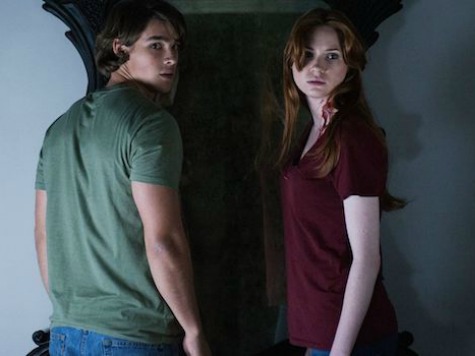
Producer Jason Blum brims with plans for what he hopes to accomplish next in Hollywood. Shepherding a $200 million movie to the big screen is not on his creative Bucket List.
Blum, the producer behind low-budget smashes like Insidious, Paranormal Activity and The Purge, wants to take risks with his stories, not worship at the altar of the four-quadrant gods.
And he says Hollywood is slowly, begrudgingly, following that example.
“Budgets were too big, and the bigger the budget, the more generic the storytelling,” Blum tells Breitbart News.
There’s little generic about Oculus, Blum’s latest horror movie project. The film chronicles the battle between two siblings and a mysterious mirror they fear played a role in the death of their father. The narrative takes some inventive turns in the final act, the kind of complicated plotting you won’t find in your standard slasher film.
The film’s budget isn’t microscopically small as is the case with the Paranormal Activity installments. Still, the price tag came in low enough to let savvy director Mike Flanagan flesh out his creepy vision.
That’s exactly how Blum likes it. And, he contends, so do the majority of the actors in his films.
“We give the director much more creative control. [Actors] are only answering to one person,” says Blum. “To an actor, it’s very comforting to know you’re being directed by one person and one person alone.”
Blum says Ethan Hawke wasn’t sure he wanted to star in a horror movie before signing on for the producer’s sleeper hit Sinister (budget: $3 million, Domestic box office: $48 million). Hawke quickly re-enlisted for Blum’s The Purge shortly thereafter.
The prolific producer is spreading beyond the horror genre in the coming months. He points to Boy Next Door, a 2015 erotic thriller with Jennifer Lopez, as being part of that evolution. The funny stuff, hopefully, will come later.
“It’s harder to do with a wide-release comedy … I think it’s crackable and we’re determined to crack it,” he says. “You can make all types of movies low budget, but it’s a matter of changing the way things have been done for a long time which is always hard to do.”
Hollywood, he says, sees the wisdom of the low-budget approach. It won’t easily embrace his model all the same.
“People are resistant to it. Representation is resistant to it. It’s not the way the system has traditionally worked. Turning the system around always takes energy,” he says.
The bottom line will make that adjustment smoother, he predicts.
“If the movie does well everyone does well. If the movie doesn’t do well, nobody gets hurt, and we continue to try and take risks,” he says.
Films like Transformers: Age of Extinction won’t be going away. Nor should they, he says. But the films themselves will benefit from less sticker shock.
“I think lots of movies will get better the less they cost,” he says.
Oculus director/co-writer Mike Flanagan says Blum isn’t just pinching pennies for profit. He has found a balance between creative freedom and commercial viability.
Movies that 10 years ago wouldn’t be able to land a wide release are suddenly able to reach 2,000-plus theaters under Blum’s care, Flanagan says. And studios are “falling over themselves to replicate his model,” Flanagan adds.
Will that impact the next generation of filmmakers? Blum says they don’t need his help. They’ve got YouTube.
“If I was young and making movies now I’d put stuff on YouTube. Keep making shorts and putting them on YouTube,” he says. “Twenty years ago you couldn’t distribute your own movies. Now, you can do it with one push of a button, and I think that’s awesome.”

COMMENTS
Please let us know if you're having issues with commenting.